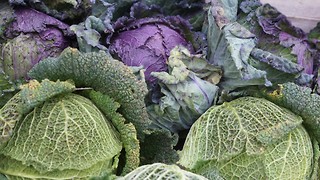Anna’s Culinary Corner
Anna Hollingsworth explores the food culture of Berlin

Week one for me kicked off not in my college library but in, uhm, Berlin. It was a study-related visit, rather than a cheeky start-of-term get-away, I promise. But as with all studying, whether in your local faculty or in the German capital, you won’t get far without a bite to eat. In the below-freezing temperatures that my trip coincided with, I had no choice but to take shelter in cafés between (and admittedly sometimes during) academic sessions, build up some calorie-induced insulation, and, well, convince myself that food is as valid a form of culture as any other.
That said, fresh from the airport, I found myself in a big queue outside a small kebab van. The thought process in my pretty solidly frozen mind must have gone along the lines of ‘when in doubt, go for a döner’ and ‘when in Berlin, do as the Berliners do.’
Allow me to explain: Berlin is the kebab capital of Europe and the birthplace of the döner. A modern take on the traditional grilled kebab created by Turkish immigrants, the döner became the no. 1 fast food option in Germany in the decades following WWII. As with all classics, there will always be the place to go (think Chelsea buns at Fitzbillies), and in this case the votes converge on Mustafa’s Gemüse kebap, a humble van in Kreuzberg, Berlin’s Little Turkey.
The sometimes hour-long queues and multiple mentions in all the travel guides testify to Mustafa’s well-deserved place on the throne of Berlin’s kebab kingdom, and with feta cheese, roasted aubergines, deep fried potato, salad, a touch of lemon, and the ‘secret ingredient’ (carnivores have theirs with chicken), Mustafa’s döner is a kebab like no other; it single-handedly redefines the hangover cure as a culinary masterpiece.
As such, the döner was well worth the biting cold and the forty minute wait, but I have to confess to envying the queuing strategy of the person behind me: this fast food aficionado was whetting his appetite by snacking on another German street classic, Currywurst. The main competitor to kebabs, Currywurst, or ‘curry sausage’, is a sausage sliced up and covered in a mild sauce of ketchup mixed with curry powder, finished off with a decent dose of chips and a bread roll.
Like with so many culinary classics, apparently this piece of genius was born by accident, when a case of clumsiness in a kitchen resulted in the combination of ketchup and curry. I know, I know, Currywurst is perhaps not the most appetising sounding dish, but I can vouch for its place among the best street foods, as it is one of the things I gave up my vegetarianism for.
As unconvincing as it may sound, I have not sold my soul to kebabs and sausages. How could I survive solely on savoury sustenance in a place like Germany with its Kaffee und Kuchen tradition? What pubs are to England, bakeries are to Germany: these havens of dough serve more varieties of freshly baked bread than all the contestants on the Bake Off put together could dream up, and pride themselves in more pastry options than your standard Patisserie Valerie. The obvious choice in Berlin is der Berliner, a type of doughnut without the hole (why you would cut out a bit of your pastry remains one of life’s great mysteries to me), filled with jam and topped with a fine coating of sugar.
This happens to also be the classic bake that got J.F.K. confused: in a valiant attempt to incorporate German into his speech, the president declared “Ich bin ein Berliner”, “I am a doughnut.” Obviously no one had mentioned to him that all you need to do to transform from a doughnut into a Berlin inhabitant is to leave out the article.
Enough of grammar. Mohnkuchen won’t get your German skills into history books, but as a love-it-or-hate-it thing this class of different types of poppy seed cakes is well worth a try; after trying a version topped with caramelised almonds from Bäcker Wiedemann near the old Friedrischstraße crossing point from East to West Berlin, I am openly in the love camp.
A perhaps less divisive option is cheesecake, which in Germany often incorporates quark, a soured milk delicacy. A real find here was a quaint café by the name of Princess Cheesecake: their traditional German cheesecake, Königlicher Käsekuchen, was one of the lightest, fluffiest things I have ever tasted, and I regret leaving Berlin without sampling more of their creations – Piña Colada cheesecake, anyone?
It was with great sadness that I had to surrender to the fact that the contents of half a bakery would probably not fare well as aeroplane cargo. So if you see someone quietly weeping outside the Van of Life or Fitzbillies, it will be me suffering from separation anxiety from my beloved döners and Berliners. Such is the life of a food tourist.
 News / ‘Out of the Ordinary’ festival takes over Cambridge 26 August 2025
News / ‘Out of the Ordinary’ festival takes over Cambridge 26 August 2025 News / Government pulls £277M in funding for Cambridge sewage works relocation25 August 2025
News / Government pulls £277M in funding for Cambridge sewage works relocation25 August 2025 Comment / Who could possibly want more exams?25 August 2025
Comment / Who could possibly want more exams?25 August 2025 News / Tompkins Table 2025: Trinity widens gap on Christ’s19 August 2025
News / Tompkins Table 2025: Trinity widens gap on Christ’s19 August 2025 Music / Spotify substitutes: can ethical streaming sound just as good?26 August 2025
Music / Spotify substitutes: can ethical streaming sound just as good?26 August 2025









